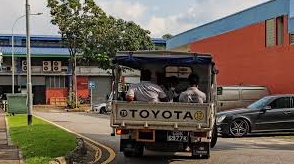Effective January 1, new guidelines mandate rain covers and “vehicle buddies” to improve the safety of transporting workers in Singapore.
SINGAPORE – New regulations for transporting workers in lorries took effect on January 1 (Sunday), addressing a long-standing issue that has raised concerns among many Singaporeans.
In 2021, a tragic series of incidents involving lorries transporting migrant workers resulted in the deaths of two individuals and injuries to over a dozen others within just five days. This prompted more than 40,000 people to sign a petition urging the Land Transport Authority to enforce mandatory safety measures for worker transport.
Images of migrant workers seated in an open lorry amidst heavy rainfall also gained traction on social media, highlighting the urgent need for reform.
On December 31, the Ministry of Manpower, Ministry of Transport, Land Transport Authority (LTA), Singapore Police Force, and the Building and Construction Authority released an advisory detailing the new requirements and recommendations for transport.
According to the Road Traffic Act, newly registered lorries must have rain covers installed on all non-enclosed sides of the canopy, with at least one side being transparent.
For light lorries currently in use, rain covers will be mandatory starting July 1 of this year, while for heavy lorries, the requirement will take effect on January 1, 2024.
Under the Workplace Safety and Health Act (WSH Act), a dual-role driver—defined as an individual designated by the employer to drive a lorry with workers in the rear deck, but for whom driving is not the primary job—must receive a minimum 30-minute rest period after working for six hours before driving workers.
Employers are also required to appoint a “vehicle buddy” to sit alongside the driver in the cabin during transport, ensuring the driver remains alert and capable of driving safely at all times.
Additionally, the Employment Act stipulates that drivers transporting workers in the rear deck of lorries cannot work more than 12 hours a day, including overtime, driving, or other job responsibilities.
Moreover, employers cannot deduct drivers’ salaries for delays, nor can they pressure workers to consent to such deductions.
“To enhance the safety of workers, employers should explore alternative transportation options (e.g., buses) whenever feasible. If other modes are impractical, employers must ensure the safety of workers traveling in lorries by implementing recommended practices that prioritize the safety of both the driver and all passengers,” the advisory noted, with further details available in the full document here.








